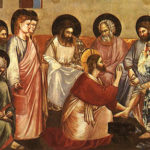We run our website the way we wished the whole internet worked: we provide high quality original content with no ads. We are funded solely by your direct support. Please consider supporting this project.

Giant Jesus
Yesterday’s post featured a video of Greg sharing about the role of the church in manifesting God’s character to the world. Here are some follow-up thoughts on that topic.
The NT often uses the metaphor of “the body of Christ” to describe the church. When Jesus walked the earth, he did so in an ordinary body, beginning with his birth in Bethlehem. Now he does not physically walk the earth, but the Church is his hands, mouth, and feet operating in the world today. The same life that was in his first body is in us, his second body. And we who belong to this second body take our marching order from the same “head” as Jesus’ first body.
This is why Luke begins Acts, which is a basic history of the early church, by reminding us that he wrote about Jesus in his gospel by saying “I wrote about all that Jesus began to do and to teach until the day he was taken up to heaven (Acts 1:1). To say that Jesus “began” to do certain things in his incarnate form implies that Jesus is now continuing to do certain things in a corporate form—through his Church.
In Luke’s mind, his Gospel was about what Jesus did through his first body, while the book of Acts is about what Jesus continued to do through his second, corporate body.
Luke sees the Church as a kind of giant Jesus.
In the book of Acts you can also see that Jesus identified with his corporate body. When Jesus knocked Paul off his horse on the road to Damascus, he identified himself as “Jesus, whom you are persecuting” (Acts 9:4). Since Jesus had ascended to heaven several years earlier, how could Paul be persecuting him? Clearly, he was doing so by persecuting the Church. Jesus apparently considered whatever happened to the Church as happening to him. Pain inflicted on his Church is pain inflicted on his body, as much as when spikes were driven into his hands and feet on the cross.
Paul wrote that we are to be “imitators of God” (Eph 5:1). The word for “imitate” (mimetai) literally means to “mimic” or to “shadow.” We are to imitate God’s every move, just as Jesus did.
Paul then fleshes out what this mimicking looks like in the following verse: “Live in love … as Christ loved us and gave himself up for us.” The body of Christ is to love others just as Christ loved in his own body, dying on Calvary for sinners.
The call to imitate Jesus is not something we can carry out with our own efforts. It’s a call to yield to the Spirit and thereby manifest the truth that Christ himself is working through us. He is transforming us into his image. He is working through his corporate body to carry out the work he began when he walked the earth.
In this way, we are a giant Jesus.
—Adapted from The Myth of a Christian Religion, pages 18-19.
Photo credit: iko via VisualHunt / CC BY-NC-ND
Category: General
Tags: Church, Discipleship, Incarnation
Topics: The Church
Related Reading

Worst Sinner Award
Jesus taught: Do not judge, or you too will be judged. For in the same way you judge others, you will be judged, and with the measure you use, it will be measured to you. Why do you look at the speck of sawdust in your brother’s eye and pay no attention to the plank…

Kingdom Centeredness
A Silent Center white knuckles cling against peace and cries for release into chaos flying, centrifugal to death in attempt to salvage human breath for breathing, through peeling purge that burns away flesh to white bone singed and aching for skin new to inhale holy fire once again, until the timely scourge of…

A Cross-Like Church
When God’s church loves like God loves—which means valuing the other at cost to self—it will puzzle those outside the church. While such love might cause the religious to rail with outrage, it will cause the searching and the hungry to ask, “how can people love like this?” In God’s plan, this puzzle is what…

Living Incarnationally
The Christian faith is centered on the belief that in Jesus Christ God became a human being. This is commonly referred to as the doctrine of the incarnation. It means that in Jesus, God became embodied. God left the blessed domain of heaven, was born in Bethlehem, and took on our humanity that we might…

A Brief History of Political Power and the Church
The history of the church has been largely one of believers refusing to trust the way of the crucified Jesus and instead giving in to the very temptation he resisted. It’s the history of an institution that has frequently traded its holy and distinct mission for what it thought was a good mission. It is…

Why have you consistently stressed the need for the Western Church to learn from the African Church?
Question: I’ve heard you argue that the white Western church has a lot to learn theologically from African cultures. What is it specifically that you’re referring to? Response: I do strongly believe that the western church needs to humbly sit at the feet of our fellow Christians in Africa. My conviction is based on four…
